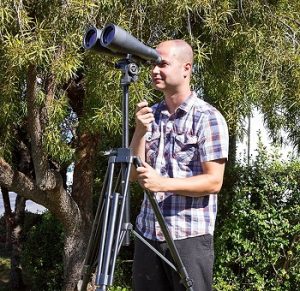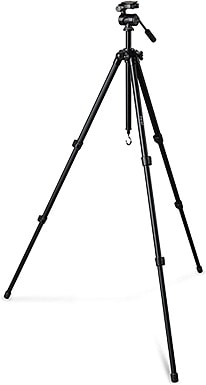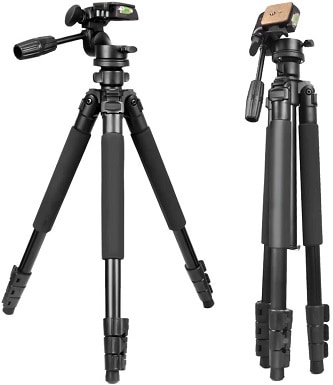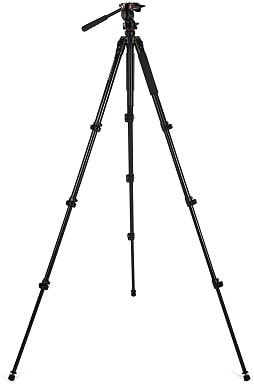7 Best Tripods for Binoculars of 2025 – Reviews & Top Picks
Last Updated on

Binoculars are neither the heaviest or largest of tools. In fact, they’ve become pretty lightweight and compact in recent years. Regardless, they can start to feel much heavier when holding them up to your eyes for long periods.
After 15 minutes of viewing, your arms are going to start getting tired! But a tripod can offer an easy solution that you can take anywhere with you and set up in just a few minutes.
Modern tripods are lightweight, sturdy, infinitely adjustable, and easily portable. You can set them to any height that works best for you, and they’ll even allow you to swivel and pan your binoculars in every direction.
We set out to see which tripods were going to be best suited for use with binoculars, and the following seven were all solid performers. We’ve written short reviews comparing each of them to help you understand their differences as well.
After testing, three of them have impressed us enough to earn our recommendations, and we’ll make sure you know which ones they are.

A Quick Comparison of Our Favorites (Updated in 2025)
| Image | Product | Details | ||
|---|---|---|---|---|
| Best Overall |
 |
Bushnell 784030 Advanced Tripod |
|
CHECK PRICE |
| Best Value |
 |
Regetek Travel Tripod |
|
CHECK PRICE |
| Premium Choice |
 |
Vortex PRO-2 Optics Pro GT Tripod |
|
CHECK PRICE |
 |
Orion Paragon-Plus Tripod |
|
CHECK PRICE | |
 |
Carson TF-200 TriForce Tripod |
|
CHECK PRICE |
The 7 Best Tripods for Binoculars
1. Bushnell 784030 Advanced Binoculars Tripod – Best Overall

Bushnell is known for making high-quality binoculars and they’ve been at it for years. Knowing that, it shouldn’t be a stretch to believe that their advanced tripod was our top pick for the best tripod for binoculars. It’s lightweight and small enough to be portable, just five and a half pounds and 26 inches long when folded up. But it’s one of those items that seems to radiate quality when you hold it. Unlike many other similarly-sized tripods we’ve seen, the Bushnell doesn’t feel flimsy or cheap at all. It feels stout and well-built. It actually feels much tougher than its 11-pound capacity would suggest. And for this substantial price, that’s exactly what we expect.
Luckily, the Bushnell tripod lived up to all expectations and turned out to be every bit as strong as it felt. Even the largest of binoculars isn’t going to be pushing this tripod close to its limits. It can extend from a minimum height of 18 inches to 61 inches so that you can set it up to use it in whatever way is most comfortable. You can stand, sit, or crouch with the Bushnell Advanced Tripod and it will offer support for your binoculars wherever you need it.
- Padded leg covers are more comfortable in heat and cold
- Individually adjustable legs
- Very solid and strong
- One of the pricier options
2. Regetek Travel Binoculars Tripod – Best Value

There are quite a few tripods on the market and they can get rather expensive. But the Regetek Travel Tripod offers a portable and reliable piece of equipment for an affordable price, which is why we think it’s the best tripod for binoculars for the money. It weighs less than three pounds so you won’t have any problems bringing this along to wherever your binoculars see the most use. If it gets windy, there’s a balance hook on the bottom where you can hang whatever you’ve got to weigh it down.
Being so lightweight, it’s not the heaviest-lifting tripod on the market. It’s got a weight capacity of 8.8 pounds. For binoculars, this is plenty. A heavy set of binoculars weighs just two pounds, so this tripod can hold the weight of four pairs without an issue. But you can feel when you hold it that it’s built with quality in mind. Features like lever-locking legs offer great strength and security. You can raise this tripod up to 63 inches for standing use, and the three-way flexible pan and tilt head makes it easy to find the best viewing angle.
- Affordably priced
- Lightweight and portable
- Balance hook to weigh it down
- Only 8.8-lb capacity
3. Vortex PRO-2 Optics Pro GT Tripod – Premium Choice

If you’re looking for a durable, versatile tripod that you never have to worry about, the Vortex Optics Pro GT Tripod is a good product to check out. It’s built sturdy and tough enough to handle any conditions you throw at it. Each leg has two lever locks for rapid and firm height adjustment that stays put. At just six pounds, this tripod isn’t the heaviest though, so a balance hook protrudes from the bottom to allow for weighing it down. You can extend this Vortex Pro to 67 inches in height, tall enough to allow for standing viewing through your binoculars. With them attached, the three-way pan head allows you precise and smooth control over their placement, allowing for 360 degrees of rotation, as well as panning, tilting, and any free movement you’d like.
Though lightweight, this tripod is plenty strong enough to mount even the largest, heaviest binoculars on without issue. It’s a very solid stand and we never even worried about it collapsing or having any other issues. It only folds down to 24 inches for travel and storage and a small carrying bag is included. Plus, the whole tripod is protected by a lifetime replacement warranty.
- Lever-lock legs
- 3-way pan head
- Balance hook for weighing it down
- Strong enough to support a heavy binocular
- Extends to 67 inches
- Expensive
4. Orion Paragon-Plus Tripod for Binoculars

Standing at 68 inches when fully extended, the Orion Paragon-Plus tripod is a robust and heavy-duty professional-quality stand for binoculars. Lever-lock legs make it quick and simple to set the tripod up to your desired height and keep it in place once you get it set. Graduated reference marks make it easy to repeat the exact same setup again. The fluid head on this tripod is only two-way, but both axes have adjustment knobs that allow for smooth and controlled motion. You can smoothly pan your binoculars around, taking a look at the world around you without any of the jumpiness and uneven movement that you experience with most tripod heads.
As soon as you grab this tripod, you can feel how sturdy it is. It’s built well, but it’s also quite heavy because of its robustness. At 10 pounds, it’s going to start weighing you down, so it’s maybe not the best-suited tool for viewing in the wilderness. It’s also very expensive, so you may decide not to take it in harsh environments and weather. But it’s built tough enough to take whatever you throw at it if you’re willing to carry the extra weight around.
- Extra heavy-duty build
- Fluid pan head for smooth swivels
- Built-in level bubbles
- Heavy at 10 pounds
- Very expensive
5. Carson TF-200 TriForce Tripod

Weighing in under three pounds, the Carson TriForce Series Tripod is a lightweight and lower-cost device that’s easy to bring along with you wherever you’re planning on doing some spotting. It’s got a minimum standing height of just 13 inches, so you can use this tripod sitting, crouching, or possibly even laying down. It extends to a maximum height of just 58 inches though, so taller individuals will likely be craning their necks to see into their binoculars on this tripod.
While portability is of prime concern, the lightweight of the Carson tripod makes it a little less durable than other options we tested. It’s made of plastic and metal, whereas some of the higher-end options featured mostly metal in their construction. But it’s built solidly and is in no danger of falling apart. It can handle whatever binoculars you wish to mount on top. It’s also quite a bit more affordable than some of the competing models we tested, which may make it more appealing to some. A built-in bubble level makes it easy to set level. The 3-way pan head allows for smooth movement in all directions, but the lightweight means that the tripod moves when you swivel.
- Minimum height of 13 inches
- More affordable than other models
- Only reaches 58 inches fully extended
- Built with more plastic than other tripods
6. Gosky Travel Portable Tripod

Sitting right in the middle of the price range, the Gosky Travel Portable Tripod is also a middle of the pack performer. At five and a half pounds, it’s not the heaviest or the lightest, but it can hold a load of up to 11 pounds. Even though it’s rated for a similar capacity to other tripods that we’ve tested, it just doesn’t feel quite as solid. It folds down to just 26 inches for transportation, but that’s not as compact as we’d prefer. When standing, you can set it as low as 18 inches or as high as 61 inches, so it doesn’t have the best reach either.
The lever-lock legs hold tight and keep your tripod set to the proper height. They’re also easy and quick to use, making setup a breeze. The 3-way pan head lets you tilt, swivel, and pan your binoculars in every direction so that you never miss anything. While the head moved pretty freely, it wasn’t quite as smooth as the nice action we experienced from some of the higher-end tripods. Of course, this one is much more affordable, though not as low-priced as the Regetek that earned our pick for best value.
- 3-way fluid pan head
- Lever-lock legs
- Lightweight
- Not as much reach as competitors
- Not the sturdiest option
Related Read: 10 Best Tripods for Photographers: Reviews & Top Picks!
7. Celestron 82052 Regal Premium Tripod

The Regal Premium tripod from Celestron seemed like a top performer at first glance. At six pounds, it feels stout and sturdy in your hands without seeming to be too heavy. We expected it to hold more than it’s rated for though since its maximum capacity is just under nine pounds, not too exciting. What’s more impressive is the 69-inch height that the Celestron tripod extends to, making it easy for almost anyone to use their binoculars when standing up. This makes the tripod much more comfortable to use, especially for long viewing periods. Of course, being extended so high can make things less stable, so a balancing hook was included so you can add some weight and increase its stability.
This is one of the more expensive tripods we’ve seen, and for the price, we don’t think it offers quite enough. The head only pans in two directions instead of the 3-way heads on other tripods at this price point. We also weren’t thrilled by the four-section legs, which took far too long to set up and adjust. Overall, we think it’s overpriced and there are better options available for a lower cost.
- Impressive 69-inch height
- Retractable balance hook for adding stability
- Four-section legs are too time-consuming
- Very pricey
- Head is only 2-way pan

Conclusion
There are tons of tripods on the market to choose from, but we wanted to find the ones that are perfectly suited for holding binoculars to make our viewing experience as comfortable and usable as possible. We tried out many of these three-legged devices, and we’ve compiled our findings in the seven reviews you’ve just read. But three of them stood out above the others as top performers and the best value. Our favorite overall was the Bushnell 784030 Advanced Tripod. It’s got a stout 11-pound capacity, individually adjustable legs, a fluid moving head, and it’s small enough to make it easy to transport.
For the best value, we recommend the Regetek Travel Tripod. It’s lightweight and portable enough to take along anywhere, strong enough to support your gear without worry, and affordable enough for any budget. But for a premium offering at a premium price, we suggest the Vortex Optics Pro GT Tripod. It extends to 67 inches, supports any size binoculars, and has a 3-way pan head for fluid viewing in any direction. All three are excellent tripods and we feel confident recommending them to you.
Table of Contents
- A Quick Comparison of Our Favorites (Updated in 2025)
- The 7 Best Tripods for Binoculars
- 1. Bushnell 784030 Advanced Binoculars Tripod – Best Overall
- 2. Regetek Travel Binoculars Tripod – Best Value
- 3. Vortex PRO-2 Optics Pro GT Tripod – Premium Choice
- 4. Orion Paragon-Plus Tripod for Binoculars
- 5. Carson TF-200 TriForce Tripod
- 6. Gosky Travel Portable Tripod
- 7. Celestron 82052 Regal Premium Tripod
- Conclusion
About the Author Robert Sparks
Robert’s obsession with all things optical started early in life, when his optician father would bring home prototypes for Robert to play with. Nowadays, Robert is dedicated to helping others find the right optics for their needs. His hobbies include astronomy, astrophysics, and model building. Originally from Newark, NJ, he resides in Santa Fe, New Mexico, where the nighttime skies are filled with glittering stars.
Related Articles:
How to Clean a Refractor Telescope: Step-by-Step Guide
How to Clean a Telescope Eyepiece: Step-by-Step Guide
How to Clean a Rifle Scope: 8 Expert Tips
Monocular vs Telescope: Differences Explained (With Pictures)
What Is a Monocular Used For? 8 Common Functions
How to Clean a Telescope Mirror: 8 Expert Tips
Brightfield vs Phase Contrast Microscopy: The Differences Explained
SkyCamHD Drone Review: Pros, Cons, FAQ, & Verdict



